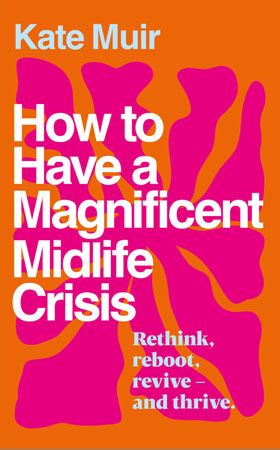Kate Muir is a women’s health campaigner, documentary maker and author. Her latest book is How to Have a Magnificent Midlife Crisis.
Coming from Glasgow, I grew up in a culture which has a rich alcoholic vocabulary. Just as the Swedish have many words for snow, the Scots have many words for the various states of drunkenness: blootered, bladdered, guttered, hammered, steaming, mortal, paralytic, stocious and miraculous. Despite a history of alcoholism in my family, I always approached a drink with enthusiasm and joy.
I’ve never considered myself an alcoholic, though I could feel the pull of addiction at one point in my forties when rarely a day went by that I didn’t have a drink. I was using drink as an evening decompressor, as many of us do at this complicated time. It’s a time when we are under immense pressure, and so we look to external relaxants which will instantly deliver that dopamine hit we might be struggling to get from elsewhere. The effect of falling hormone levels on the brain can lead to an increase in addictive behaviour – a drop in estrogen levels leads to reduced serotonin and affects the pleasure receptors in the brain. Essentially, we find ourselves chasing highs that seem harder and harder to achieve.
From early on, we are fed ‘female-friendly’ advertising for pink gin and prosecco – all very Instagrammable, giving the impression these drinks are fun and insubstantial, despite their very real alcohol content.
Our Ability to Process Alcohol
Physically, we simply cannot drink as we did in our younger years, and far from helping, alcohol actually compounds the physical symptoms of menopause. Your liver metabolises alcohol, and it metabolises hormones too, so when things are already hormonally unstable, that overload can intensify mood swings and hot flushes.
Our ability to process alcohol changes as we age, particularly for women in their forties and fifties. Wine is a particularly bad culprit, and after just a couple of glasses, hangovers take on unexpected proportions. This is because wine contains sulphites, histamine and tyramine. Changing estrogen levels in midlife can increase histamine release and inhibit its breakdown. We need histamine, but in excess it can cause histamine intolerance, including headaches, digestive issues and skin reactions. Alcohol also messes with our carefully curated stomach microbiome, killing good bacteria.
The Scary Science
Unfairly, this increasing intolerance seems to affect women more than men. As women age, their ability to metabolise alcohol decreases, so there’s slower elimination of the toxins, and the ethanol in alcoholic drinks is technically a poison, which we handled better when we were younger. I talked to Dr Fatima Khan, an Australian menopause expert, and she explained that ‘women generally have less of the enzyme that breaks down alcohol, dehydrogenase, which makes us more susceptible to its effects. So we absorb more into the bloodstream than men do.’
Regular alcohol use changes your brain patterns, raises cortisol and stress levels, and then, of course, you want to drink more to chill out. This is the scary science bit, because uncontrolled cortisol levels and stress over time can lead to long-term health problems. Plus, menopausal women who drink more than two units of alcohol a day increase their chances of getting breast cancer by 20 per cent.
I’m not saying we should all be giving up alcohol, but in midlife, we need to give it a long, hard stare and maybe change our consumption patterns. This will look different for everyone, and for many of us, these midlife changes may mean it just works better for us to drink differently, or less. Personally, I have given up drinking almost completely.
It has been a joy and a relief – one less thing to worry about. It also played into my midlife vanity. My skin became clearer, I was sleeping better and I felt much healthier.
Fun and Sparkle
A long time ago, I interviewed Mary Karr about The Liars’ Club, her terrific memoir of growing up with an alcoholic mother. I loved this quote: ‘When I got sober, I thought giving up was saying goodbye to all the fun and sparkle, and it turned out to be just the opposite.’
However, I am not in any way dismissing the lifelong struggle so many others have with alcohol, drugs and other addiction – the unspeakably hard, soul-bearing, past-eviscerating work and the relapses they may have to overcome to get to that safe place of sobriety.
Getting to Know Yourself
Women are the fastest-growing demographic becoming alcohol-dependent, and this is – or at least should be – a big topic in the midlife conversation. I regularly listen to the You Are Not Broken podcast by the brilliant Dr Kelly Casperson. In a ‘sobriety special’, she told listeners:
‘Alcohol is so normalised yet so incredibly destructive. Here’s to your personal growth, whether that for you is decreasing or stopping your relationship with alcohol completely or something else. Getting to know yourself on a deeper level as we age is truly precious.’ I like that.
Sober Curious?
Further Reading & Resources
How to Have a Magnificent Midlife Crisis
By Kate Muir. Published by Gallery Books UK (£16.99) – out now.

Alcohol Change UK
Support and info for anyone worried about their drinking, plus advice for family & friends.
Try Dry App
Free app to help you meet your goals, whether you want to cut down or go totally alcohol-free.
Ditch the Hangover – The Sober Girl Society
On challenging drinking norms and the cultural factors that influence our drinking.
- Lead picture credit: Ales Maze on Unsplash

